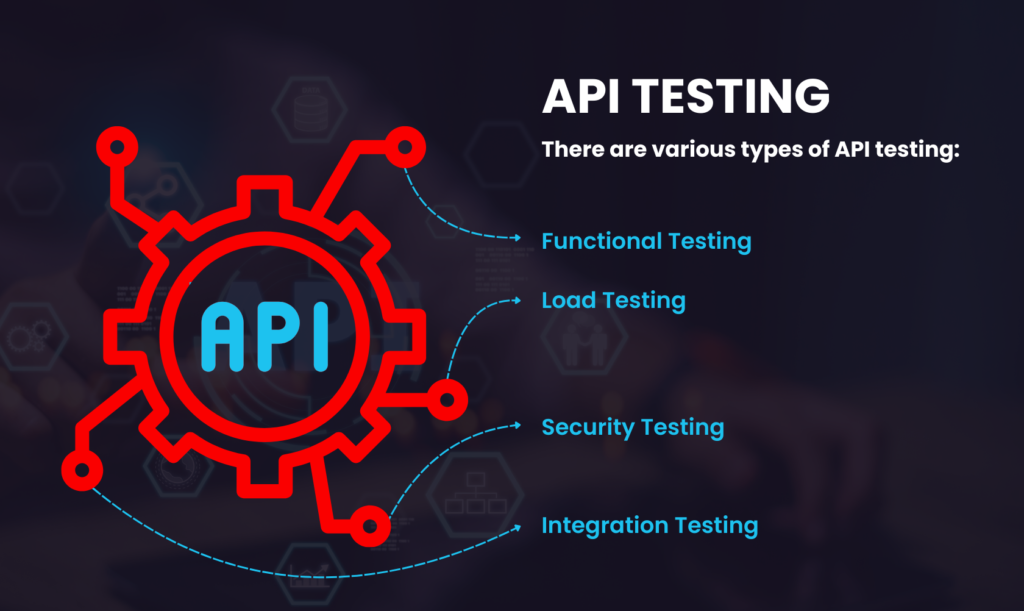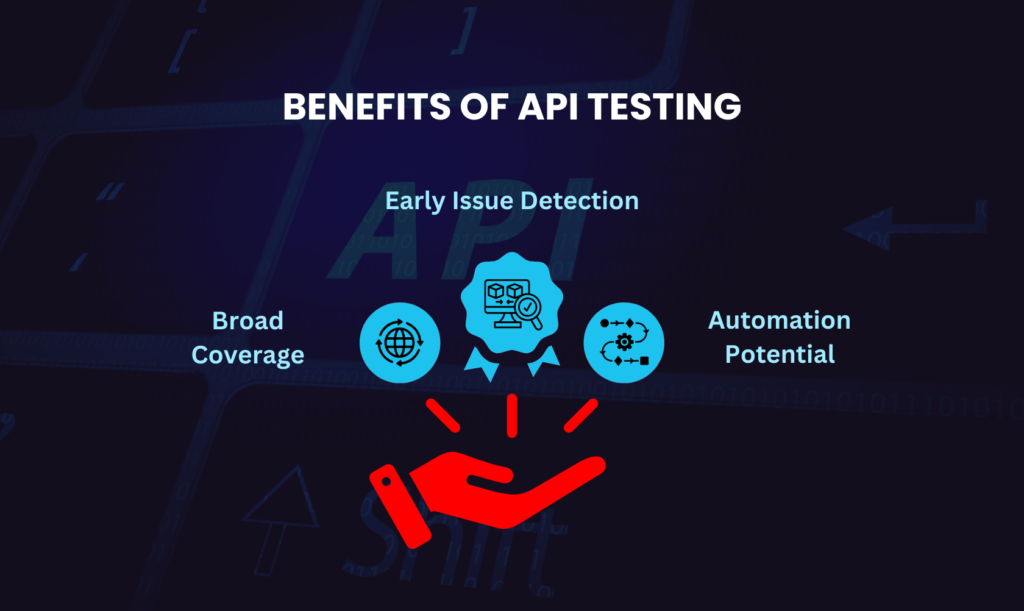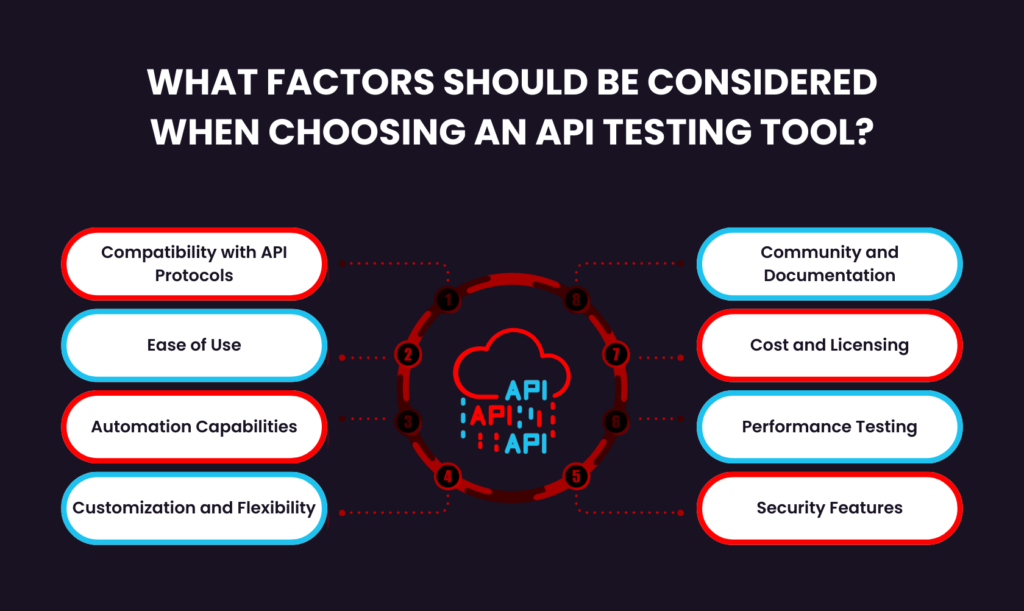Table of Contents
What is an API?
Top 10 API testing tools: An API (Application Programming Interface) is an intermediate allowing communiqué among software elements or systems. Application Programming Interface (APIs) uncovers exact information and functionalities while extracting inside difficulty.
They are classically classified as GraphQL APIs, SOAP or REST, each using altered communiqué procedures. REST APIs, for case, use HTTP requirements to DELETE data, POST, GET or PUT, while SOAP trusts on XML Contacting procedures for more consistent contacts.
What are API Testing Tools?
API testing tools are particular platforms that permit designers and samples to make, perform, and automate tests to confirm that APIs work as estimated. These tools can test numerous features of an Application Programming Interface (API), counting security, performance, reliability and functionality. Some Characteristics of Innovative API testing tools contain CI/CD pipeline integration, multi-environment testing and support for scripting.
A free/open source Application Programming Interface testing tool often delivers core Functions like real-time reporting, automated test execution, request simulation and making them perfect for small crews or budget-conscious administrations.

There are various types of API testing:
- Functional Testing: Authenticates the Application Programming Interface (API’s) response beside estimated productivities.
- Load Testing: Pretends high-traffic atmospheres to test the Application Programming Interface (API’s) presentation under pressure.
- Security Testing: Confirms the Application Programming Interface (API) is secure from common weaknesses such as cross-site scripting (XSS) or SQL injection.
- Integration Testing: Approves that Application Programming Interface (APIs) appropriately mix with other systems.
When should you choose Open-Source API Testing Tools?
Selecting an open-source API testing tool is contingent on numerous issues, counting budget constraints, team capabilities and project size. Here are main situations where free/open-source Application Programming Interface testing tool strength is the right choice:
- Customization Requirements: Open-source tools deal litheness. Since the source code is available, designers can adjust the tool’s behavior to bring into line with their exact testing wants. This is mainly valuable when normal testing workflows don’t suffice.
- Budget Constraints: Cost is often a defining factor for lesser teams or startups. A free/open source Application Programming Interface (API) testing tool permits teams to accomplish in-depth testing without giving for licensing fees related with proprietary utensils.
- CI/CD Integration: If your crew is attentive on unceasing addition and deployment, open-source tools usually deliver plugins and additions with CI tools like Travis CI, CircleCI or Jenkins. This permits for seamless automated testing through the software growth lifecycle.
- Community-Driven Development: Many open-source Application Programming Interface (API) testing tools advantage from strong community participation. This outcomes in best practices, expansive libraries of shared testing scripts, user-driven improvements and frequent updates.
Benefits of API Testing

Application Programming Interface API testing tools provides major value by allowing complete authentication of request behavior at the Application Programming Interface API level, confirming that the information exchange among facilities is accurate, safe, and enhanced.
Below are the core benefits:
- Early Issue Detection: Application Programming Interface API testing hooks problems initial, diminishing the threat of late-phase dangerous bugs and saving time.
- Broad Coverage: It delivers complete testing for numerous circumstances like concurrency, invalid inputs and data formats.
- Automation Potential: Application Programming Interface (APIs) is perfect for automation, letting rapid test implementation, effective deterioration testing, and unswerving results.
10 Top API Testing Tools to Use
From automation abilities to complete test reporting, these tools deal numerous types to meet your Application Programming Interface (API) testing wants. Here is a list of the most extensively used Application Programming Interface API testing tools in the market:
Testsigma
Testsigma is an AI-powered, cloud-based test automation platform designed for web, mobile, and API testing. It enables both technical and non-technical users to create and execute automated tests effortlessly using natural language processing (NLP).
Key Benefits of Testsigma
| Feature | Description |
|---|---|
| Codeless & Code-Based Testing | Supports both script less automation and custom scripting for flexibility. |
| Unified Test Automation | Automates API, UI, and end-to-end testing for web, mobile, and desktop apps. |
| Seamless CI/CD Integration | Easily integrates into DevOps pipelines for continuous testing. |
| Advanced API Testing | Enables REST API validation with multiple verification methods. |
Pricing
Get started with a free trial and explore flexible pricing plans tailored for teams of all sizes.
Who Can Benefit from Testsigma?
Designed for developers, QA professionals, and businesses of all scales, Testsigma streamlines automation for cross-browser, UI, regression, integration, and compatibility testing ensuring high-quality software delivery with maximum efficiency.
REST Assured
REST Assured is a powerful open-source library designed for testing RESTful APIs in Java. It streamlines API validation with a simple and intuitive syntax, making it a preferred choice for developers and testers working in Java environments.
Key Features of REST Assured
| Feature | Description |
|---|---|
| Open Source | Available for free, making it cost-effective for teams and organizations. |
| Easy Validation | Simplifies REST API testing in Java with an intuitive and developer-friendly approach. |
| BDD Syntax Support | Supports Gherkin-style (Given, When, Then) syntax for clear and readable test cases. |
| Seamless Integration | Easily integrates with Java-based continuous testing and automation frameworks. |
| Data-Driven Testing | Enables comprehensive testing with parameterized test cases. |
Pricing
REST Assured is completely free as an open-source tool, making it an excellent choice for API testing without additional costs.
Who Should Use REST Assured?
Ideal for developers and testers working on Java-based applications, REST Assured is best suited for those with Java expertise. While it excels in API automation, it lacks a graphical user interface, making it less suitable for manual API testing and direct performance testing.
Soap UI
SoapUI is a widely used open-source tool for testing REST and SOAP web services. It simplifies API testing with an intuitive interface, making it accessible for both beginners and experienced testers.
Key Features of SoapUI
| Feature | Description |
|---|---|
| User-Friendly Interface | Drag-and-drop functionality enables quick test creation without advanced coding skills. |
| Efficient Debugging | Provides a clear UI and built-in debugging tools to easily identify and resolve issues. |
| Multi-Environment Support | Configures tests for QA, staging, and production environments to ensure seamless testing. |
| Scripting Capabilities | Allows advanced scripting to enhance testing beyond standard assertions. |
Pricing
SoapUI is free and open-source, offering essential API testing features. For advanced functionalities like enhanced security testing and detailed reporting, a paid version (ReadyAPI) is available.
Who Should Use SoapUI?
SoapUI is ideal for developers and testers of all levels. Its ease of use benefits beginners, while its scripting flexibility allows experienced users to build complex test scenarios, making it suitable for both small projects and enterprise applications.
Katalon
Katalon is a versatile test automation tool designed for web, mobile, API, and desktop applications. With its intuitive interface and powerful features, it caters to both beginners and experienced testers, enabling efficient and scalable test automation.
Key Features of Katalon
| Feature | Description |
|---|---|
| User-Friendly Interface | Simplifies test creation with an intuitive design, making it accessible for all skill levels. |
| BDD Syntax Support | Enables Behavior-Driven Development (BDD) for clearer and more readable test scripts. |
| Data-Driven Testing | Allows parameterized testing to improve test coverage and flexibility. |
| Hybrid Testing | Supports end-to-end and API testing within a single platform for a seamless testing experience. |
Pricing
Katalon offers a free version with essential features, while its paid plans provide advanced functionalities and dedicated support. Pricing varies based on the chosen package and project requirements.
Who Should Use Katalon?
Katalon is ideal for individual testers, QA teams, and enterprises looking for a robust automation solution. It’s particularly useful for those adopting hybrid testing strategies and integrating testing into CI/CD workflows.
JMeter
JMeter is an open-source testing tool designed for performance, load, and functional API testing. It provides a scalable solution for developers and testers to simulate heavy user loads and analyze system performance efficiently.
Key Features of JMeter
| Feature | Description |
|---|---|
| Easy Setup | Requires only a simple download of the JMeter jar file to start testing. |
| Open-Source | Completely free, making it an accessible tool for individuals and organizations. |
| Command-Line Execution | Supports CLI-based test execution, enabling automation and detailed reporting. |
| Extensible with Plugins | Enhances functionality through a wide range of plugins for customized testing needs. |
Pricing
JMeter is an open-source tool available at no cost, making it a budget-friendly option for performance testing.
Who Should Use JMeter?
JMeter is ideal for developers and testers focused on performance and API testing. While it offers powerful features, users may need some experience to maximize its capabilities effectively.
Insomnia
Insomnia, developed by Kong, is a feature-rich API testing tool designed for both manual and automated testing. It offers a simple setup and an intuitive interface, making it accessible for beginners while providing advanced functionalities for experienced testers.
Key Features of Insomnia
| Feature | Description |
|---|---|
| Easy Installation | A simple installer allows quick setup and hassle-free usage. |
| User-Friendly Interface | Intuitive design makes navigation and test creation effortless. |
| Comprehensive Testing | Supports both manual and automated API testing with assertions. |
| Plugin Support | Enables users to extend functionality by creating custom plugins. |
Pricing
Insomnia offers a free version with essential features, while paid plans provide additional capabilities and support for advanced testing needs.
Who Should Use Insomnia?
Ideal for developers and QA testers, Insomnia caters to those seeking a straightforward yet powerful API testing tool. Its user-friendly approach benefits beginners, while its extensibility appeals to advanced users working on complex test automation.
Karate
Karate is an open-source API testing framework that simplifies test automation with its built-in Behavior-Driven Development (BDD) approach. Unlike traditional BDD tools, it eliminates the need for step definitions, making it accessible for both technical and non-technical users.
Key Features of Karate
| Feature | Description |
|---|---|
| Minimal Coding Required | Enables API testing with simple, predefined scenarios, reducing the need for complex scripting. |
| Built-In JSON Validation | Provides automatic JSON validation, ensuring compliance with modern web standards. |
| Multi-Language Support | Supports Java and JavaScript, offering flexibility for different testing needs. |
| Parallel Execution | Allows tests to run simultaneously, speeding up execution and feedback. |
Pricing
Karate is completely free as an open-source tool, making it a cost-effective solution for API testing.
Who Should Use Karate?
Karate is ideal for developers, testers, and even non-technical stakeholders who want an easy yet powerful API testing tool. Its simplicity and robust features make it suitable for both small teams and large enterprises.
Postman
Postman is a widely used tool designed for API testing, offering an intuitive interface and comprehensive features for both manual and automated testing. It’s favored by developers and QA engineers for its ease of use and robust capabilities, streamlining the testing process and integration into workflows.
Key Features of Postman
| Feature | Description |
|---|---|
| Intuitive Interface | Easy-to-navigate UI, making it simple for users to start testing without complex setup. |
| Automation Support | Automate tests with JavaScript scripts and integrate into CI/CD pipelines. |
| Environment Flexibility | Supports multiple environments and variable configurations for diverse testing scenarios. |
| Data-Driven Testing | Enables thorough testing by using data sets for dynamic API evaluations. |
Pricing
Postman provides both free and paid versions. The free version offers essential features, while the paid plans unlock advanced capabilities for extensive testing needs.
Who Should Use Postman?
Postman is ideal for developers and QA engineers who need an efficient tool for API testing, from simple validations to advanced automation and integrations.
Cypress
Cypress is an open-source test automation framework designed for developers and QA engineers. It provides a unified solution for various types of testing, including API testing, component testing, and end-to-end testing, all within a single framework.
Key Features of Cypress
| Feature | Description |
|---|---|
| Simple Setup | Installs easily as a Node package, streamlining the integration process. |
| Built-In API Testing | Offers robust API testing capabilities without requiring extra libraries. |
| Mocking Capabilities | Efficiently tests APIs with mock data, even before the API is fully developed. |
| All-in-One Framework | Supports component, API, and end-to-end testing, reducing the need for multiple tools. |
Pricing
Cypress is free as an open-source tool, with paid plans available for advanced features and support, including access to the Cypress Dashboard.
Who Should Use Cypress?
Cypress is ideal for developers and QA engineers proficient in JavaScript who need an all-in-one solution for both front-end and API testing, making it perfect for teams aiming for fast, reliable, and low-maintenance test automation.
Playwright
Playwright, an open-source tool maintained by Microsoft, is designed for end-to-end testing and supports API testing. It allows teams to streamline their testing processes by using a single framework for various types of testing, ensuring efficiency across multiple testing needs.
Key Features of Playwright
| Feature | Description |
|---|---|
| Simple Setup | Quick and easy installation, requiring minimal effort to get started. |
| Multi-Language Support | Supports a variety of programming languages, including Java, JavaScript, and Python. |
| Mocking Capabilities | Allows for API request mocking, enabling tests to be written before the actual API is developed. |
| Built-In Reporters | Provides built-in reporters, including HTML format, for detailed test results. |
Pricing
Playwright is free to use as an open-source tool, making it an accessible choice for developers and organizations looking for a budget-friendly test automation solution.
Who Should Use Playwright?
Playwright is best suited for developers and test engineers who require a flexible testing framework that handles both end-to-end and API testing. It’s ideal for teams that use multiple programming languages but may not be the best fit for those without a technical background.
What Factors should be considered when choosing an API Testing Tool?

When choosing an Application Programming Interface API testing tool, it’s vital to weigh numerous issues to confirm it aligns with your project necessities and workflows.
Here are the key deliberations:
- Compatibility with API Protocols: Confirm that the tool backings the application Programming Interface API procedures you work with, such as GraphQL, SOAP or REST some tools are flexible and backing numerous procedures, which might be dangerous for complex testing atmospheres.
- Ease of Use: The usability of the tool shows a huge part in embracing. Tools with instinctive interfaces, like Insomnia and Swagger UI, are calmer for both designers and samples to use. For more complex scenarios, scripting litheness is a key.
- Automation Capabilities: If you need nonstop testing as part of your CI/CD pipeline, confirm the tool deals strong automation support. Tools like Karate DSL and Postman are recognized for their seamless CI/CD additions.
- Customization and Flexibility: Reflect tools that deal Personalization, such as the capability to write scripts, make configure environment variables or complex workflows. Tools like JMeter and Rest-Assured deliver wide litheness for custom test situations.
- Community and Documentation: An active community and good certification are acute for backing and troubleshooting. Widespread tools like Wire Mock and SoapUI have strong societies and extensive capitals.
- Cost and Licensing: Some tools deal a free tier or open-source form with essential Characteristics, while others come with paid types. Weigh the cost beside your project wants to confirm the tool deals good worth.
- Performance Testing: Some Application Programming Interface API testing tools, like JMeter, and Apache Bench, deal built-in presentation testing competences, which are crucial if you’re testing load handling or scalability.
- Security Features: Security testing features, such as verification management and susceptibility discovery, are acute when dealing with private information.
Explore More: Top 10 IoT Security Tools That You Must Know
FAQ
How do API testing tools support performance testing?
Tools like JMeter and SoapUI support performance testing by simulating load and stress conditions on the API, helping measure response times, throughput, and resource utilization under different traffic levels.
What kind of security testing do API tools support?
API testing tools like SoapUI and Postman can be used to perform security testing, such as validating authentication methods (OAuth, API keys), performing vulnerability scanning, and checking for common security risks like SQL injection, cross-site scripting (XSS), and more.
Can API testing tools help with mocking APIs?
Yes, tools like Postman, Insomnia, and Playwright support API mocking, which allows testing to occur even when the API is not fully developed. This helps teams simulate API behavior and test without waiting for the backend to be ready.
How do I choose the right API testing tool for my team?
When selecting an API testing tool, consider factors such as:
The tool’s ease of use and learning curve.
1. Supported features (e.g., security testing, performance testing, mocking).
2. Integration with existing tools and CI/CD pipelines.
3. Cost (open-source vs. paid options).
4. Team expertise and the programming languages being used.



